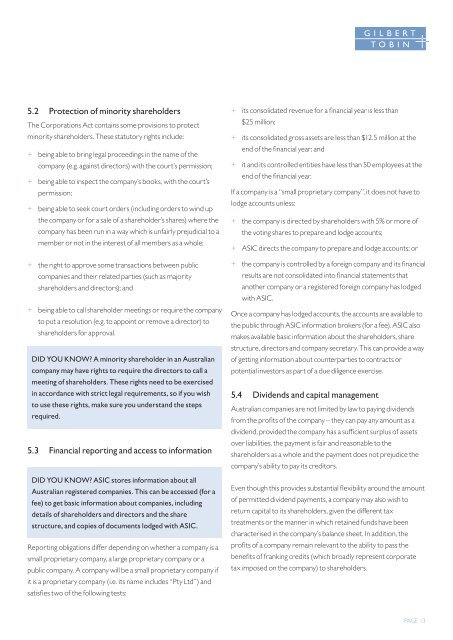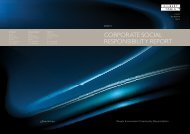Gilbert + tobin - Gilbert and Tobin
Gilbert + tobin - Gilbert and Tobin
Gilbert + tobin - Gilbert and Tobin
Create successful ePaper yourself
Turn your PDF publications into a flip-book with our unique Google optimized e-Paper software.
5.2 Protection of minority shareholders<br />
The Corporations Act contains some provisions to protect<br />
minority shareholders. These statutory rights include:<br />
+ + being able to bring legal proceedings in the name of the<br />
company (e.g. against directors) with the court’s permission;<br />
+ + being able to inspect the company’s books, with the court’s<br />
permission;<br />
+ + being able to seek court orders (including orders to wind up<br />
the company or for a sale of a shareholder’s shares) where the<br />
company has been run in a way which is unfairly prejudicial to a<br />
member or not in the interest of all members as a whole;<br />
+ + the right to approve some transactions between public<br />
companies <strong>and</strong> their related parties (such as majority<br />
shareholders <strong>and</strong> directors); <strong>and</strong><br />
+ + being able to call shareholder meetings or require the company<br />
to put a resolution (e.g. to appoint or remove a director) to<br />
shareholders for approval.<br />
Did you know A minority shareholder in an Australian<br />
company may have rights to require the directors to call a<br />
meeting of shareholders. These rights need to be exercised<br />
in accordance with strict legal requirements, so if you wish<br />
to use these rights, make sure you underst<strong>and</strong> the steps<br />
required.<br />
5.3 Financial reporting <strong>and</strong> access to information<br />
Did you know ASIC stores information about all<br />
Australian registered companies. This can be accessed (for a<br />
fee) to get basic information about companies, including<br />
details of shareholders <strong>and</strong> directors <strong>and</strong> the share<br />
structure, <strong>and</strong> copies of documents lodged with ASIC.<br />
Reporting obligations differ depending on whether a company is a<br />
small proprietary company, a large proprietary company or a<br />
public company. A company will be a small proprietary company if<br />
it is a proprietary company (i.e. its name includes “Pty Ltd”) <strong>and</strong><br />
satisfies two of the following tests:<br />
+ + its consolidated revenue for a financial year is less than<br />
$25 million;<br />
+ + its consolidated gross assets are less than $12.5 million at the<br />
end of the financial year; <strong>and</strong><br />
+ + it <strong>and</strong> its controlled entities have less than 50 employees at the<br />
end of the financial year.<br />
If a company is a “small proprietary company”, it does not have to<br />
lodge accounts unless:<br />
+ + the company is directed by shareholders with 5% or more of<br />
the voting shares to prepare <strong>and</strong> lodge accounts;<br />
+ + ASIC directs the company to prepare <strong>and</strong> lodge accounts; or<br />
+ + the company is controlled by a foreign company <strong>and</strong> its financial<br />
results are not consolidated into financial statements that<br />
another company or a registered foreign company has lodged<br />
with ASIC.<br />
Once a company has lodged accounts, the accounts are available to<br />
the public through ASIC information brokers (for a fee). ASIC also<br />
makes available basic information about the shareholders, share<br />
structure, directors <strong>and</strong> company secretary. This can provide a way<br />
of getting information about counterparties to contracts or<br />
potential investors as part of a due diligence exercise.<br />
5.4 Dividends <strong>and</strong> capital management<br />
Australian companies are not limited by law to paying dividends<br />
from the profits of the company – they can pay any amount as a<br />
dividend, provided the company has a sufficient surplus of assets<br />
over liabilities, the payment is fair <strong>and</strong> reasonable to the<br />
shareholders as a whole <strong>and</strong> the payment does not prejudice the<br />
company’s ability to pay its creditors.<br />
Even though this provides substantial flexibility around the amount<br />
of permitted dividend payments, a company may also wish to<br />
return capital to its shareholders, given the different tax<br />
treatments or the manner in which retained funds have been<br />
characterised in the company’s balance sheet. In addition, the<br />
profits of a company remain relevant to the ability to pass the<br />
benefits of franking credits (which broadly represent corporate<br />
tax imposed on the company) to shareholders.<br />
PAGE 13







